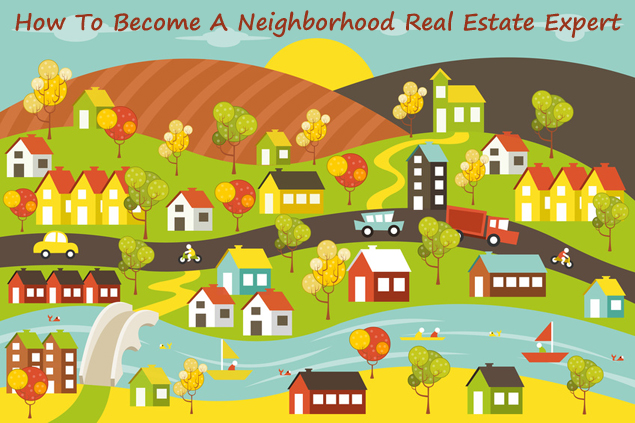By Anita Clark
With marketing methods so widespread and fairly simple to master, it’s easy to call ourselves a local real estate expert, industry leader, or market guru. However, many consumers quickly see through that charade and beat feet, moving on to agents who are actually walking the walk. So, what can you do to better position ourselves to truly become a market expert and generate a steady stream of prospects, leads, and new clients?
It starts with developing a neighborhood niche. Whether you are a new agent or a seasoned pro, establishing and cultivating a neighborhood presence is a great way to achieve market share and help your business reach new heights.
Unless your market area is completely rural or strictly downtown, one of the best ways to grow your brand is becoming a neighborhood real estate expert. This could be the new luxury subdivision in your area, or the hundred-home mid-tier community, or the first-time buyer neighborhood. There are marketing opportunities that many of us are missing, so instead of haphazardly farming these neighborhoods, here are several strategies to help you refocus and become a neighborhood real estate expert.
Selecting the Right Neighborhood
What constitutes “right” is different for each of us. Your decision may be personal, strictly business, or a combination of the two. Whatever your rationale, here are a few of the things worth considering when you start analyzing which neighborhood you want to become the real estate expert for.
- Price range
- Style or type of home
- Number of homes in the neighborhood
- Property turnover
- Home/price stability
- Homeowners association
- Area (i.e. schools, highway access, amenities, etc.)
- You live there
- Future growth
- Personal preference
Once you decide on the factors most important to you, and have chosen a neighborhood, it is time to jump in and begin the prep work to learn everything about the subdivision you can.
Get Out and About
Before you start marketing to or about an area, you need to put eyes on the neighborhood. It sounds obvious but it’s surprising how many agents miss this critical step in their hurry to start putting information out for consumers.
Hit the Streets: There is no better way to know all the neighborhood details than to walk, ride, or drive through the area at various times of the day. After a few visits, patterns will develop, and you should have a good understanding of the general noise level, street activity, access, egress, and/or retention issues, have a sense of the community vibe, and even learn some annoying and/or interesting facts about the neighborhood. Also make it a point to check out the local area such as schools, restaurants, recreation, shopping, hospitals, and anything else of importance in the vicinity.
Talk With Homeowners: Ensure you talk to residents during your visits to get their take on life in the area and learn information you will not find anywhere else (i.e. like the areas that flood during rainy periods, where/when traffic congestion is high, HOA enforcement, well/dimly lit areas at night, condition of onsite amenities, walking paths, recreational areas, community traditions, etc.).
Be Visible: If you actually live in the community, helping out with neighborhood events, serving on a subdivision committee or PTA, volunteering your time and resources, sponsoring a cause, team, or event, hosting functions or having local seminars (i.e. home seller tips, ways to improve your landscaping, what upgrades have the best ROI, etc.), and actively engaging with others in the community will not only get you seen but remembered.
View Available Homes: It is important to visit every home for sale in the neighborhood. While online photos can give you a good sense of what a property is like, there is no substitute for crossing the threshold and seeing the home in person. Knowing the personal details will set you apart when consumers start asking specific questions.
Once you have gathered all your area intelligence, it is now time to get busy creating your web of neighborhood information.
Promoting the Neighborhood
There are a number of great ways to showcase your knowledge of a particular neighborhood:
Blogging: Write as much positive information about the neighborhood as possible. Give plenty of details and facts with insight that you gained while checking out the area. Personalize your reports with tidbits other agents may not know to showcase your in-depth knowledge of the area. Find local, regional, and national opportunities to guest blog about the neighborhood, making sure to link back to your main article on your site. You can even take things to the next level and create a community blog, sharing information about every aspect of living in the area, what is close-by, and even upcoming projects. The only limits are those you set yourself.
Market Reports: Produce and promote them on your website, providing a level of real estate detail that other agents farming this area are not providing. The more specific (in layman’s terms) you can be with the information the better. Share these reports at HOA meetings, get approval to post them to the neighborhood site (if one exists), and even mail them out to residents if your budget allows for that type of expenditure.
Videos: By all means, create them. A walk-through of the neighborhood showing off all the great things it has to offer or a drive-through (mounted camera) to highlight the size of the subdivision and the condition of the homes/yards should be on your radar. Optimize the video, share it socially, and embed it in your main blog article about the community. If you are not camera-shy, step in front of the camera and narrate one-to-two minutes of information (perhaps market report data or something you like about the area). Whatever type of videos you make, keeping them under three minutes in length is sufficient to give those looking a decent idea what the neighborhood is all about.
Social Media: This is one of the easiest ways to share your neighborhood information and quickly get it in front of as many eyes as possible. Share on all your social media sites, ensuring you target local readers and groups if possible. For example, if you use Facebook, create a community page to share everything you have learned as well as your blog(s), reports, videos, and anything else about the subdivision you want the public to know.
Print Media: If you are fortunate enough to already have listings in this neighborhood, just listed/just sold postcards are a great idea. Other good ways to show your expertise is via neighborhood flyers showcasing various aspects of the subdivision and newsletters with upcoming community/area events. If you are looking to gain a foothold, volunteer to have open houses for other agents and promote via local print media to ensure the event is well-publicized. By all means, let the neighbors know about homes for sale via mail-outs or postcards as they may have friends/family who are looking to purchase a home in the neighborhood.
Parting Neighborhood Shots
If you want to be the neighborhood go-to agent it takes some preparation, patience, and a little upfront work to build your brand but the rewards can be tremendous. Once established as the neighborhood real estate expert, and you are generating new clients on a regular basis, it may be time to branch out and find another niche to conquer (perhaps even another neighborhood).
Lastly, do not forget to ask for online reviews for each of your closed transactions. Many consumers start their online search by checking out reviews made by others. If you have provided quality service the reviews you receive should reflect that, further cementing you as the local neighborhood real estate expert, and the agent both buyers and sellers want to work within this area.
Anita Clark is a residential real estate agent with Coldwell Banker SSK, REALTORS®, in Houston County, Georgia. She is from Coventry, England, is a retired military spouse, and has been assisting buyers, investors, and sellers since 2007. Connect with Anita on Facebook, Google+, LinkedIn, Twitter, and YouTube.


Comments 2
Excellent article as always Anita. Thank you very much!
Great points as usual Anita Clark!